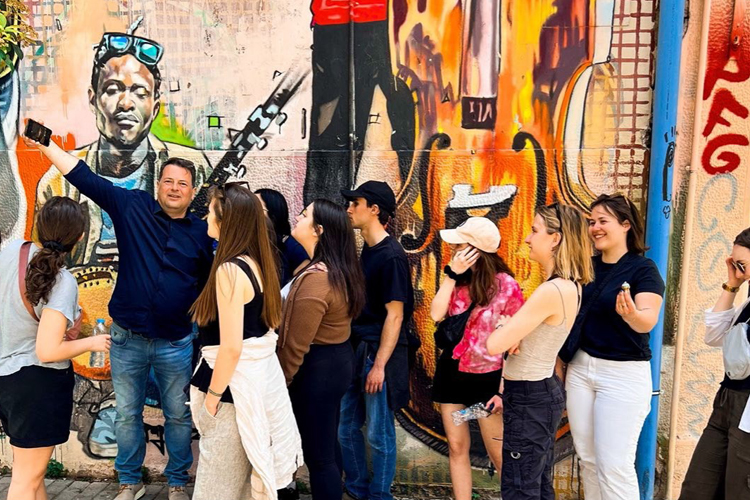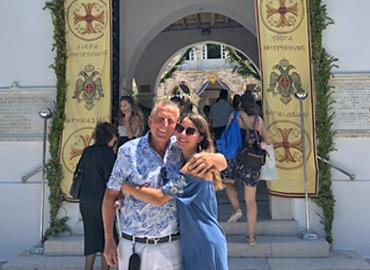Generous Hellenic Heritage Foundation support is about so much more than excellent Modern Greek instruction

With its significant support of the Centre for European & Eurasian Studies (CEES, formerly the Centre for European, Russian & Eurasian Studies) at the Munk School of Global Affairs & Public Policy, the Hellenic Heritage Foundation has opened the door to so much more than a better understanding of the Greek language, culture and diaspora.
Through its recent extraordinary $500,000 gift to ensure access to comprehensive Greek language studies in years one, two and three in the Faculty of Arts & Science, the foundation is helping students strengthen their connection to the Greek diaspora in Canada specifically and other analogous cultures more generally to develop the tools they need for careers in Europe — and even here in Canada.
This brings the foundation’s total giving to more than $2.7 million. Previous support has included courses in political science, contemporary Greek politics and history, a 10-day long field course in Athens where students develop individual research projects and interview local experts, and an intensive summer course in Athens & Rhodes. The foundation also supports the Hellenic Heritage Education Portal.
“Somehow Greek has really taken off at U of T — there’s a lot of student demand for courses,” says Edward Schatz, director of CEES and a professor in the Department of Political Science. “This gift fully covers Greek language instruction from introductory to intermediate to advanced in perpetuity, which is fantastic because a terrific program needs a stable foundation.”

The Hellenic Heritage Foundation has been a long-time supporter of U of T’s efforts to elevate Greek language studies.
“The centre here is premised on the idea — and our programs are built on the idea — that to really know a place from the inside out, you have to know the language at least to a reasonable degree of fluency,” says Schatz.
“We believe the core of our program has to be language acquisition, so students can really become regional experts,” adds Robert Austin, associate director of CEES and a historian of the Balkans and Central Europe. “By expanding the Greek language program, we are able to graduate students who start at the University of Toronto as beginners and leave with an understanding of advanced Greek. From an employment perspective for undergrads, it opens up enormous doors as most jobs are asking for advanced language knowledge.”
As well, the Hellenic studies initiative provides students with the skills they need to study and do internships in Greece. In fact, many students plan careers there after graduating.
“You just cannot go and live and work in Greece if you don’t speak Greek and a lot of our students envision a career in Greece,” says Austin, also a professor, teaching stream at CEES.
“Without the Hellenic Heritage Foundation’s support, many students would miss the opportunity to study Modern Greek beyond the basic communication level and to gain insights in aspects of the Greek literature and culture, which are not normally introduced in elementary and intermediate language courses,” says Themistoklis Aravossitas, a professor in Modern Greek language and culture at the centre. “A three-year progressive sequence of courses in Modern Greek allows students to develop higher skills in the language.”
That includes students like Angela Vastis.
“I’m of the mind that the more languages one has in their arsenal the better,” says fourth-year student Vastis, who graduated in June with her honours bachelor of arts with a major in European affairs and minors in political science and linguistics as a member of Trinity College.
Drawn to U of T for its strongly supported Greek community, Vastis says her education — including five Greek language classes as well as the history of Greece — will help as she enters law school in September and in the career that follows.
“I’m leaning toward sport and entertainment law and, like my intermediate abilities in German and French, Greek will broaden my client pool and also allow me to have more connective relationships with those European clients,” says Vastis, who was also member of the Greek Student Association and worked one summer at the Greek Consulate in Toronto.
The support is aligned with the Hellenic Heritage Foundation’s overall mission to preserve, promote and advance Hellenic education, culture and heritage in Canada.
“For us, it’s well beyond language. It is about creating connections with people of all cultural backgrounds. Creating a sense of openness and belonging is at the heart of being Greek and that is something we continually look to give back, which is why this is such an incredible project for us. With U of T, we are able to create the opportunity for people who have grown up in a community that has a significant Greek presence to build a broader connection and immerse themselves in that culture in an even greater way. Our mandate is to promote and expand Hellenism and we now have the ability to stay engaged with future leaders throughout their university career. That is incredibly powerful, and we are honoured to partner with CEES at U of T to deliver this,” says John Mavriyannakis, a Hellenic Heritage Foundation board member and chair of the foundation’s strategy and major projects committee.
It’s also a way to give back, he says.
“As a diaspora, we’re less than 100 years old from when we really started to emigrate to Canada to today. What this diaspora has been able to do is largely because of the openness of Canada. This support offers an opportunity for us to give back and say, ‘thank you.’ ”
Source: artsci.utoronto.ca











Σχόλια Facebook